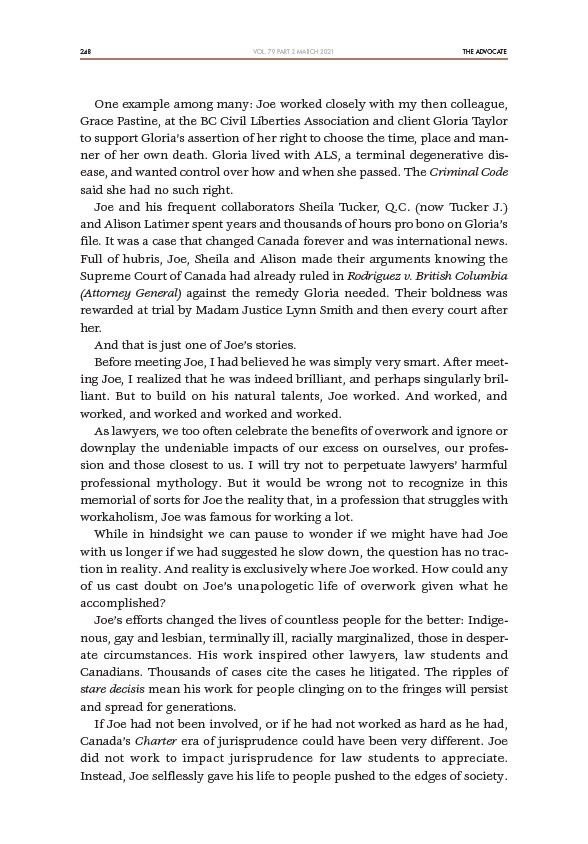
248 THE ADVOCATE
VOL. 79 PART 2 MARCH 2021
One example among many: Joe worked closely with my then colleague,
Grace Pastine, at the BC Civil Liberties Association and client Gloria Taylor
to support Gloria’s assertion of her right to choose the time, place and manner
of her own death. Gloria lived with ALS, a terminal degenerative disease,
and wanted control over how and when she passed. The Criminal Code
said she had no such right.
Joe and his frequent collaborators Sheila Tucker, Q.C. (now Tucker J.)
and Alison Latimer spent years and thousands of hours pro bono on Gloria’s
file. It was a case that changed Canada forever and was international news.
Full of hubris, Joe, Sheila and Alison made their arguments knowing the
Supreme Court of Canada had already ruled in Rodriguez v. British Columbia
(Attorney General) against the remedy Gloria needed. Their boldness was
rewarded at trial by Madam Justice Lynn Smith and then every court after
her.
And that is just one of Joe’s stories.
Before meeting Joe, I had believed he was simply very smart. After meeting
Joe, I realized that he was indeed brilliant, and perhaps singularly brilliant.
But to build on his natural talents, Joe worked. And worked, and
worked, and worked and worked and worked.
As lawyers, we too often celebrate the benefits of overwork and ignore or
downplay the undeniable impacts of our excess on ourselves, our profession
and those closest to us. I will try not to perpetuate lawyers’ harmful
professional mythology. But it would be wrong not to recognize in this
memorial of sorts for Joe the reality that, in a profession that struggles with
workaholism, Joe was famous for working a lot.
While in hindsight we can pause to wonder if we might have had Joe
with us longer if we had suggested he slow down, the question has no traction
in reality. And reality is exclusively where Joe worked. How could any
of us cast doubt on Joe’s unapologetic life of overwork given what he
accomplished?
Joe’s efforts changed the lives of countless people for the better: Indigenous,
gay and lesbian, terminally ill, racially marginalized, those in desperate
circumstances. His work inspired other lawyers, law students and
Canadians. Thousands of cases cite the cases he litigated. The ripples of
stare decisis mean his work for people clinging on to the fringes will persist
and spread for generations.
If Joe had not been involved, or if he had not worked as hard as he had,
Canada’s Charter era of jurisprudence could have been very different. Joe
did not work to impact jurisprudence for law students to appreciate.
Instead, Joe selflessly gave his life to people pushed to the edges of society.